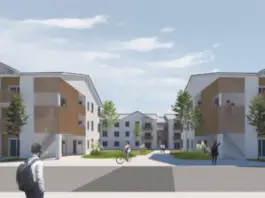Construction has broken ground on the first phase of the Summertown Apartments in Meridian, Idaho. Boise Developers began building quickly after a construction credit of US$19.4 million was obtained by a joint venture between Phoenix Commercial Construction and 111 Capital. The first phase of the project will include 36 garden-style residences and 30 rental townhouses. A portion of the loan will be utilized to pay for land development in phase one, as well as land development for an additional 125 multifamily apartments and nine single-family lots in phase two of the project. The funding was supplied by Trez Capital. Summertown Apartments will feature 200 apartments spread across 13.7 acres when completed.
Also Read: Construction of Topgolf facility in Boise officially begins, Idaho
The neighborhood will be located at 745 W. Ustick Road, about 13 miles northwest of downtown Boise via Interstates 84 and 184. Within 4 miles of the site, there will be many retail, entertainment, and food opportunities, including The Village at Meridian Mall. Settlers Park will be located just across the street from the property, while Roaring Springs Water Park will be located around 4 miles south. Construction has been postponed till now because to the COVID-19 epidemic, according to BoiseDev. A clubhouse, yoga and gym room, pool, media room, pet park, and courtyard will be among the community facilities. There will also be patios and 404 parking spaces.
More on financing the Summertown Apartments in Meridian, Idaho
The joint venture got another US$27.7 million construction credit for the project in December 2019. Parkview Financial supplied the loan, which was negotiated on behalf of the borrower by Avison Young Capital Markets Group. The loan was generated on the borrower’s behalf by Scott Mehlman, Vice President, Origination at Trez Capital. Meridian’s development and demand, according to Mehlman, are attributable to its slower-paced lifestyle and home affordability, a trend that began to increase during the pandemic, resulting in a housing crisis in the area.

